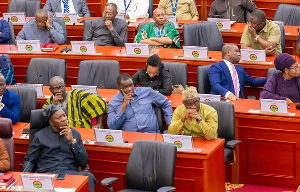Opinions of Thursday, 8 December 2011
Columnist: Amponsah, John
Ghana, Africa and the World Powers Part I
By John Amponsah
It appears we have a situation in Ghana were one of the major political parties (NDC) is increasingly aligned with the East while the other major political party (NPP) is aligned with the West. Recently President Mills visited Cuba. His other major trips were to China and Japan last year while the Mills government has made major investments with a Korean company (STX). The leader of the opposition, Akuffo Addo, has recently visited the UK. We can assume that NDC has Eastern (Chinese) support while NPP has Western (British) support.
How will this play out in the forthcoming elections? We can assume that the Chinese in particular will attempt to offer support to NDC while Britain and their Western allies will attempt to offer support to NPP.
One may wonder what the "Obama factor" is in this equation. What about the fact that Obama visited Mills? My answer to this question is that Mills showed the world he preferred to do business with the East rather than with the West. At the same time that President Mills visited China and Japan, there was a business meeting in New York to which he was invited, however our president chose to go with the Chinese. Will the Americans support NPP in the coming elections? It is possible, but NPP can be sure of British support.
None of this should be seen as negative. In fact a healthy level of competition between the two major political parties should in theory bring out the best in both of them for the benefit of the people. The other political parties are unfortunately not strong enough so we have a bipolar distribution of influence between NDC and NPP in our country.
What will be negative will be to suffer interference from East-West power manoeuvrings in ways that could be detrimental to the relative peace we enjoy in our country.
The dynamics of power have changed a great deal since the Cold War era. After the fall of the Soviet Union, America was the undisputed superpower of the world throughout the nineties. Power dynamics began to change in last decade with the formation of BRIC (Brazil, Russia, India and China) which has now evolved to BRICS since the addition of South Africa to the group. The superpower dominance of the US then turned into a tripolar situation with the US, EU and BRICS as the three points of power.
Yet what power are we talking about? Let us take a moment aside to talk about power. The strong nations of the world are powerful because they have economic and military might. These are supported by technological advancement and a well educated and capable population. So the strength of a nation can be determined by military might, economic might, technological advancement, sophisticated educational system and strength of the population, which includes high levels of employment, good health, relative peace and other such factors which manifest in the socio-cultural expression of the people.
On the world stage, it is economic and military might that really show the power of a nation. A superpower is meant to have both. In today's world, we are witnessing a very interesting situation where America, the undisputed military powerhouse of the world is faced with serious economic challenges which potentially threaten its status as a superpower. On the other hand, China is emerging as the new superpower with massive economic resources but not (yet) with a military as strong as that of the USA.
To paint this picture a bit better, imagine that the US currently has special forces in over 120 countries in the world which have effectively been turned into small to large (depending on the country) US bases. Reuters in an article published in October 2011 puts the US deficit at $1.3 trillion for the fiscal year that ended on September 30th. China on the other hand does not have many military bases around the world however for the year 2011, the Chinese revealed in October that they have a budget surplus of $550 billion, which by the way their government is desperate to spend before the end of this year. Military-wise, the US has 11 working Aircraft carriers while China has only one.
So that gives the reader some idea of how China (arguably an emerging superpower) and the US (arguably a declining superpower) express their power on the global stage. At the current time, China's power is economic might over military might while US power is military might over economic might.
How is this relevant to Africa? Well one need only look at how many African countries have been (neo)-colonized by US bases through AFRICOM. As of October 2008, Among the African countries that have an AFRICOM base are: Algeria, Botswana, Djibouti, Ethiopia, Ghana, Kenya, Liberia, Morocco, Nigeria, Senegal, South Africa and Tunisia. One could conveniently add Cote d'Ivoire and Libya now, although their previous leaders were vehemently opposed to the idea. Among those countries where there is a proposal to have an AFRICOM base are Angola, Cameroon, Chad, DRC, Gabon, Tanzania, Mali, Mauritania, Niger, Rwanda and Uganda. The latter two have governments that work very closely with US Special forces.
China on the other hand is approaching Africa through economic trade, since China's power is economic might over military might. African countries with major Chinese investments are Algeria, Guinea, Nigeria, Kenya, Madagascar, South Africa, Sudan, Tanzania, Zambia, Zimbabwe and to a lesser extent Cote d'Ivoire (maybe not anymore!) DRC, Egypt, Ethiopia, Libya (maybe not anymore!) Morocco, Niger.
You will notice that not all these countries have AFRICOM bases. This is an important point to take into consideration. The world is currently at a very important crossroads. We are seeing manoeuvres by the world's powers that have not occurred since the Cold War or perhaps arguably not ever before. Two major events which, if they occurred simultaneously, could trigger a chain event that could change the face of power on this planet forever: 1) The complete fall of the Eurozone and 2) Full scale war in Syria. I will explain how these two events can possibly affect the world, Africa and Ghana in particular.
It is obvious that the western world is going through economic upheaval. The Euro is in danger of falling. Everyday we hear more bad news about this. Today we were told that Standards and Poors could degrade the credit ratings of 15 major European countries in the EU. Each day it gets worse.
Asia on the other hand and China in particular are not suffering in the same way as the west is. The money is now in the East. Very few will dispute this fact.
The fall of the Euro and a war in Syria will bring economic and military might into conflict in a way that can possibly destroy the world as we know it today. Some have called this a looming world war 3, and not without reason. NATO which is the embodiment of Euro-American military power is struggling to be influential in the world through military ways although the countries that make up this alliance are economically BROKE! The UN Security Council is now split between West and East with the Euro-American establishment (Britain, France and the US) forming one coalition while the Eastern Bloc (China and Russia) are on the other side of the equation. It almost seems as if the western power hawks are saying that if they are going down then they will take the East along with them.
So enter Syria. Folks, as I said in an earlier article this country is now on the way to being the next victim of Euro-American power through NATO intervention. The CIA and their allies are all over the place, with their special forces supporting the Syrian Resistance Army.
Things are different this time around though. Not since the height of the Cold War (in particular the Cuban missile crisis) have the US and Russia gone head to head as they doing in Syria. With the exception of Syria, Iran and possibly Lebanon the US has the entire region littered with military bases (symbols of US military might). Syria is however the only country in the region that has a Russian base (at Tartus) dating back to Soviet times. In a very similar way to the Cuban missile crisis of the 60's, the US has sent an armada of ships led by the aircraft carrier USS HW Bush to the area. Russia responded in kind by sending an armada of ships led by their only (and an extremely advanced and capable) aircraft carrier Admiral Kuznetsov to deliver advanced S-300 missiles to the Syrian army (a deal which they say was made years ago). Although it is not mentioned in the news, you can imagine that those waters in the entire area are also littered with US and Russian nuclear armed submarines. It is easy to connect the dots.
Unlike the Libyan situation where Gaddafi more or less stood alone, in Syria it is different, and vastly more dangerous to the rest of the region and to the world. A conflict with Syria instigated by NATO intervention will draw in Iran and Lebanon and will almost certainly include Israel. Pakistan will come to the aid of Iran which will bring China into the war (the Chinese have recently said something to the effect that a conflict with Pakistan is a conflict with China). Once China and Pakistan are in the war, India and Russia will almost certainly enter the war. At this point it will be a world war and Africa will not be left out of it. The way the world is looking today, this scenario is not as inconceivable as it would have been even three years ago.
Africa should not be turned into a battle ground where a declining superpower and her allies compete against an emerging superpower and her allies while using African nations and peoples as pawns. This is a real possibility in a world war scenario. In such a situation, it can be imagined that the US will station or attempt to station NATO forces in those countries that already have AFRICOM. Liberia is one African country I can think of that could easily be used as a major access point for US-NATO forces. China with its massive army can easily mobilize forces into countries like Sudan, Zambia and Zimbabwe as staging points for Chinese forces. Countries that have both AFRICOM and Chinese investments could see some bitter battles between East and West power blocs.
The China-Russia alliance is potent because China has the money and vast military might with a huge population while Russia has even vaster military might but not so much money and not such a large population. Russia under Putin (both as president and as prime minister) has become very strong over the last decade so Russian influence on the world stage cannot and should not be underestimated.
In the face of overwhelming numbers, the Western Alliance could play the India card since India on the military level is allied with the west and India definitely has a large human population just as China has. All of a sudden, you would find Indians fighting Chinese on African soil in a world war scenario.
HOW TO AVOID A WORLD WAR
Quite simply, it is high time the UN got reformed. The UN, even though it has had some changes, still has a structure that reflects the situation after world war two.
Western countries under NATO should avoid starting a conflict with the East and instead focus on fixing their economies. More war only benefits the hawkish control freaks in the military-industrial complex and their corporate friends who get easy access to defeated countries. The East should find ways to avoid having a military conflict with the West and if that fails then powerful Eastern countries such as China should find ways of using their economic power to either own or help the West in ways that will avoid conflict.
In Africa, our situation is different It is high time African nations and their leaders start thinking about making agreements between themselves to avoid fighting each other if events were to lead to a world war situation. Africa neither has economic nor military might to counteract the powers of East and West. In the face of overwhelming force, the best approach may be to allow occupation but also to adopt peaceful, non-cooperative approaches rather than direct conflict.
The most dangerous areas in Africa at the minute are those where both East and West are vying for control and influence. Ghana falls into this category, especially because our current president has allied himself with "left wing and Eastern Interests". We can be sure that the CIA, MI6 and other western intelligence “enforcers” are watching Mills. Mr President, since you have allied yourself with China, it is probably in your interest to ask the Dragon Societies to back you up, if you have not already done so. We can also imagine that NPP has "conservative Western support". As I said earlier in this article, this is not necessarily a negative development although we have seen that East-West competition in Africa can be detrimental to African leadership (Nkrumah and Lumumba as two examples) so it is up to us to avoid this situation.
HOW CAN AFRICA BECOME MORE POWERFUL
In the end, it is only when Africa becomes more interdependent and more self-reliant (from East-West patronage) that we can look out for our best interests. At the moment, we are open to both economic and military invasion. Some say that colonization was bad for Africa and indeed it was. Western economic slavery through IMF schemes is being replaced in some places by potential Eastern economic slavery through massive Chinese investment in Africa.
To become stronger, Africa needs a very strong educational industry. Education leads to advancement in technology that affects both the economic and military arenas of power. If a superpower such as the US or China is really interested in empowering Africa, it will invest heavily in educational infrastructure which will empower Africans to take charge of our own development. It is better to empower nations in making their own roads and building their own hospitals.
Of the two superpowers, China is the more likely one to make such an investment, primarily because they have the money. So, before 2011 is over, how about earmarking/investing some of that massive $500 billion that desperately needs to be spent before the end of the year on building and improving institutes of economics and institutes of technology in all those countries that have massive Chinese investment? Scholarships to study in the host countries are great but this is even better! Obviously this kind of investment is longer term but it is high time African nations start putting such proposals on the table when making deals with China. As for the US, I don't think they will or are in the position to do such a thing, which is really too bad.
Next, African nations need to link up more with each other, go beyond MOUs and start forging real and interdependent economic and technological links between respective countries. The suggestion will be for "progressive" African countries to start this drive in order to encourage others to do so. This could be in the spirit of Latin American cooperation, where Latin countries have interlinked their banking systems in a way to make them less dependent on the West.
It will be better for Africa to be more self-reliant. African leaders have to insist on getting knowledge transfers through initiatives such as the establishment of educational institutions as part of their trade deals with powerful nations. The more powerful and technologically advanced nations are often reluctant to do this (case in point Japan, which was willing to flood their goods into the Malaysian market but not knowledge transfer, during the early Mahathir Mohammed years). African nations have to make links between themselves. It is going to be an upward struggle.
FINAL WORDS
As we approach the important year of 2012, all well meaning Ghanaians should play close attention to the events happening not only nationally but globally. If as a planet we survive the current economic and military challenges threatening to possibly destabilize the planet in the not-so-distant future then as a nation, we Ghanaians should then focus on having a healthy, free, fair and competitive (why not?) election. May the best team win, but remember that there are forces at play in the background. Let us not allow these forces to destabilize our nation, one nation in Africa which could potentially serve as an example for many others and hence as a catalyst for change on the entire continent.














